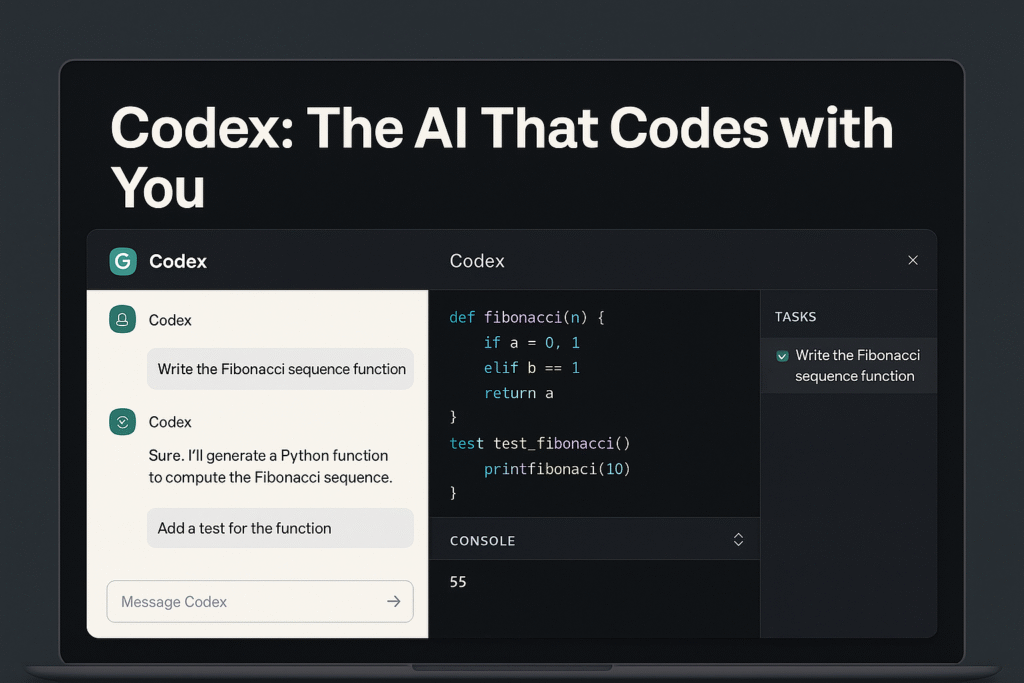OpenAI introduces Codex, an AI-powered coding agent integrated into ChatGPT, revolutionizing how developers write and debug code. Learn how this tool enhances productivity and streamlines workflows.

OpenAI has once again pushed the boundaries of AI innovation with the launch of Codex, a powerful AI coding assistant now embedded within ChatGPT. This new feature is designed to help developers write, debug, and optimize code more efficiently, making software development faster and more accessible.
With Codex, OpenAI aims to bridge the gap between human creativity and machine efficiency, providing real-time coding assistance that understands context, suggests improvements, and even generates entire functions on demand.
What Is Codex?
Codex is an advanced AI model trained on vast amounts of publicly available code, enabling it to understand and generate programming syntax across multiple languages, including:
- Python
- JavaScript
- Java
- C++
- Go
- Ruby
- And more
Unlike traditional code autocompletion tools, Codex interprets natural language prompts, allowing developers to describe what they need in plain English and receive functional code snippets in return.
Key Features of Codex in ChatGPT
1. Natural Language to Code Conversion
- Describe a function or algorithm in simple terms, and Codex generates the corresponding code.
- Example: “Write a Python function to sort a list of dictionaries by a specific key” instantly produces usable code.
2. Debugging & Error Fixing
- Paste problematic code, and Codex identifies errors, suggests fixes, and explains issues.
3. Code Optimization
- Get recommendations for improving performance, readability, and efficiency.
4. Multi-Language Support
- Switch between programming languages seamlessly without losing context.
5. Learning & Documentation Assistance
- Ask Codex to explain complex concepts or generate documentation for your code.
How Developers Can Benefit
- Faster Development Cycles – Reduce time spent on repetitive coding tasks.
- Lower Barrier for Beginners – New coders can get instant help understanding syntax and best practices.
- Enhanced Productivity – Focus on logic and architecture while AI handles boilerplate code.
- Real-Time Collaboration – Use ChatGPT as a pair programming partner.
Potential Concerns & Limitations
While Codex is a game-changer, it’s not without challenges:
- Code Quality Assurance – AI-generated code should always be reviewed for security and efficiency.
- Over-Reliance Risk – Developers must still understand underlying principles.
- Licensing & Attribution – Ensure generated code complies with open-source licenses.
The Future of AI-Assisted Coding
OpenAI’s integration of Codex into ChatGPT signals a shift toward AI-augmented development, where programmers and AI collaborate to build better software faster. As the model evolves, we can expect:
- Tighter IDE Integrations – Direct plugin support for VS Code, JetBrains, etc.
- Customizable AI Coders – Fine-tuned models for specific industries or codebases.
- Advanced Debugging – Predictive error detection before runtime.
Final Thoughts
The launch of Codex within ChatGPT is a major leap forward for developers, students, and tech enthusiasts. By automating tedious aspects of coding, OpenAI is enabling more people to create, experiment, and innovate.
Will AI replace developers? Unlikely—but it will undoubtedly transform how we code.
Are you excited to try Codex? Let us know how it impacts your workflow!
OpenAI Codex, AI coding assistant, ChatGPT for developers, AI-generated code, programming with AI, best AI coding tools, OpenAI updates, natural language to code, debug with AI, future of software development.
